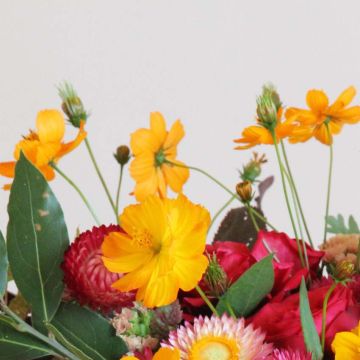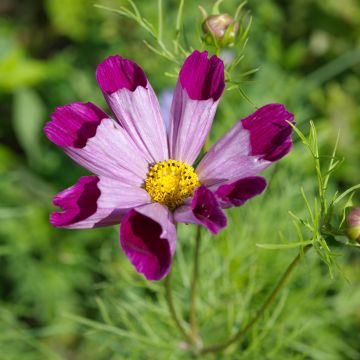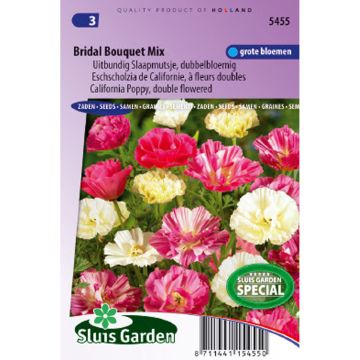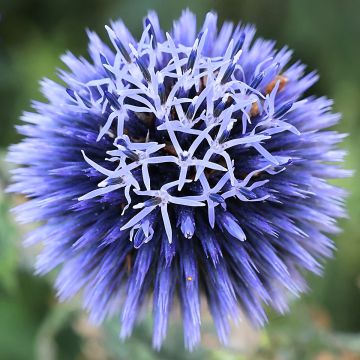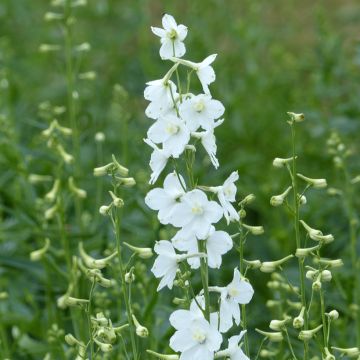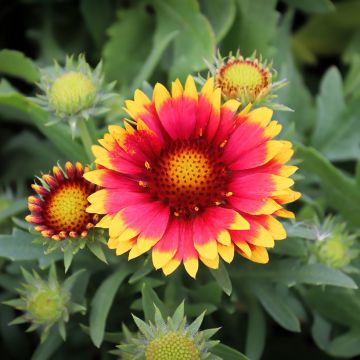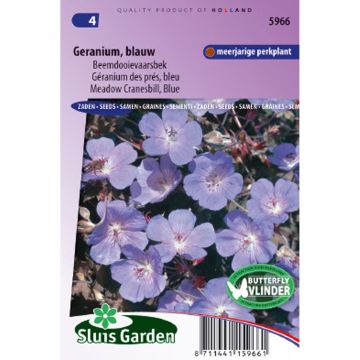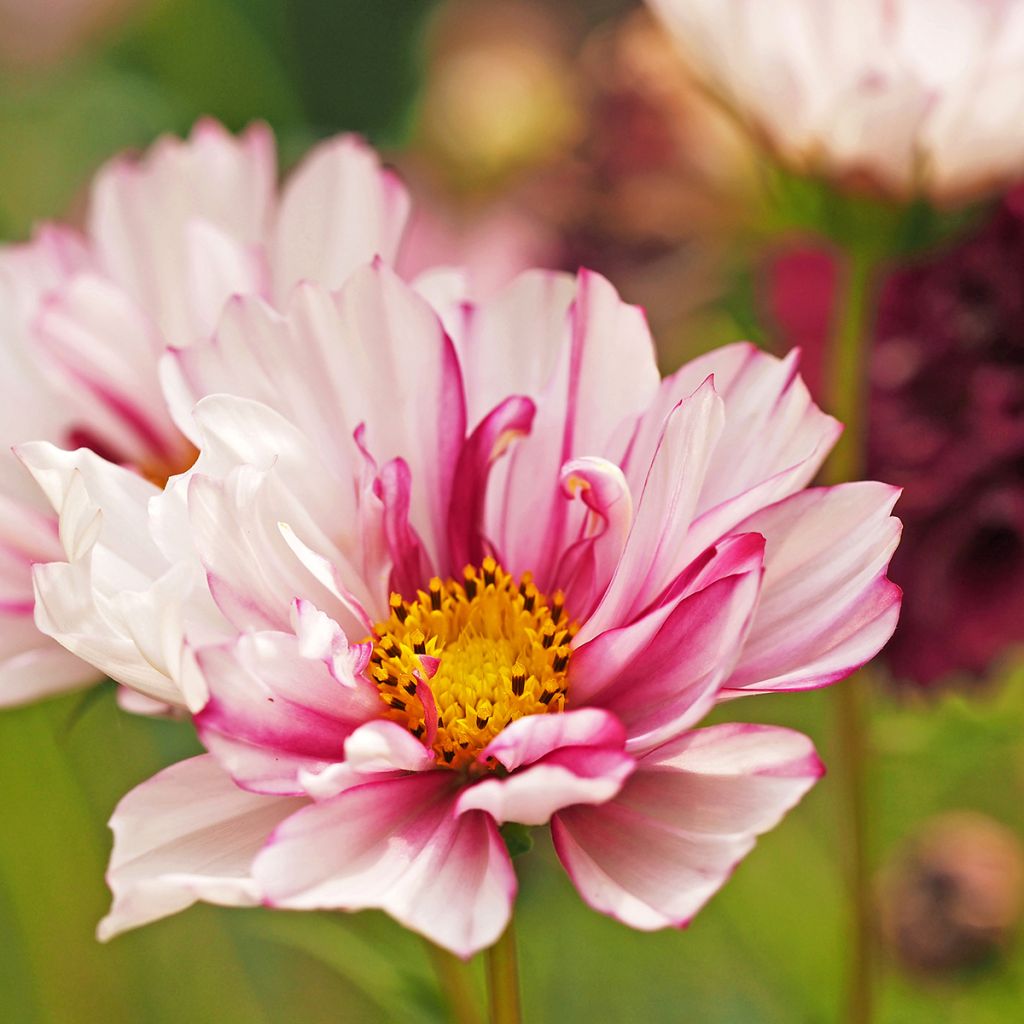

Graines de Cosmos Double Click Bicolor Pink - Cosmos bipinnatus
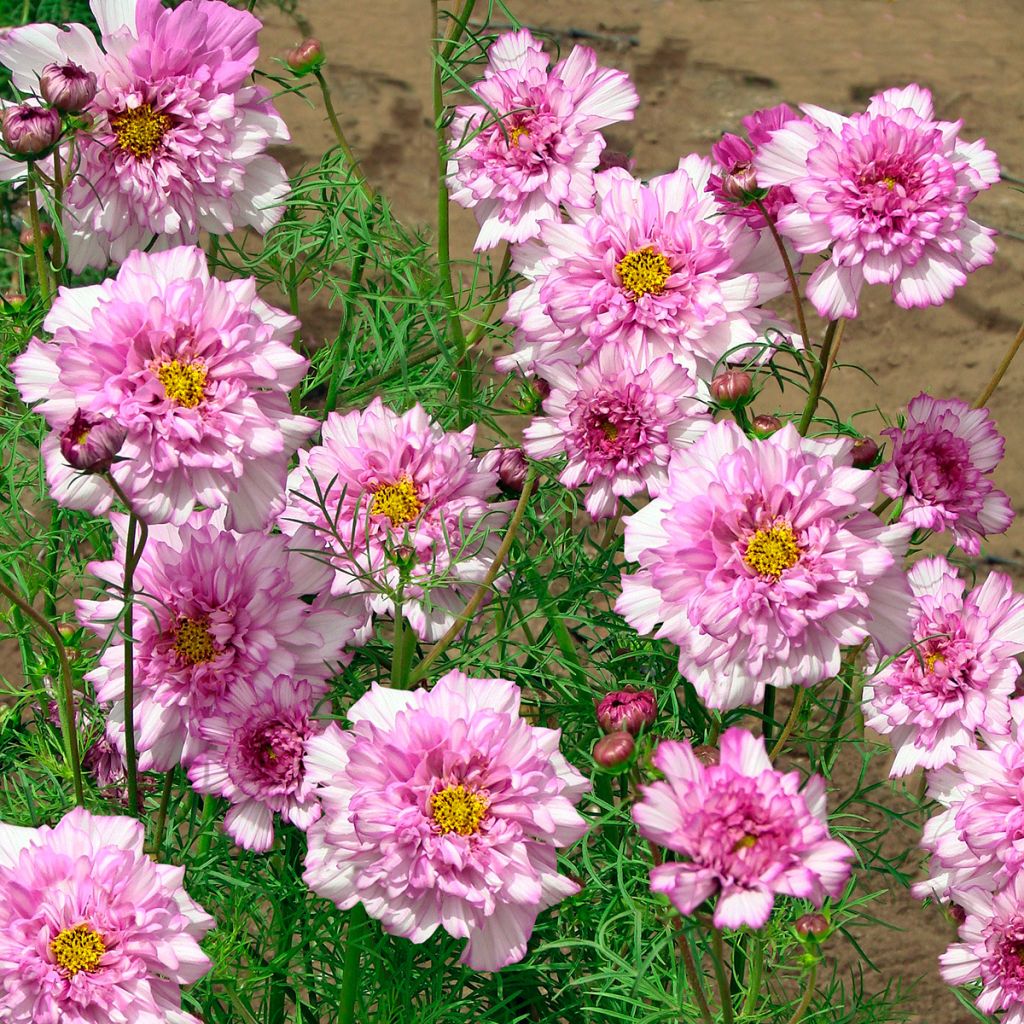

Graines de Cosmos Double Click Bicolor Pink - Cosmos bipinnatus
Cosmos x bipinnatus Double Click Bicolour Pink
Cosmos x bipinnatus Double Click Bicolor Pink
This item cannot be shipped to the selected country
Dispatch by letter from €3.90
More information
Schedule delivery date,
and select date in basket
This plant carries a 6 months recovery warranty
More information
We guarantee the quality of our plants for a full growing cycle, and will replace at our expense any plant that fails to recover under normal climatic and planting conditions.
Seed-only orders are dispatched by sealed envelope. The delivery charge for seed-only orders is €3.90.
Does this plant fit my garden?
Set up your Plantfit profile →
Description
Cosmos 'Double Click Bicolour Pink' is an annual variety that forms large, frilly pompom flowers in a mix of pink and white. The colours of the 'Bicolour Pink' flowers vary greatly in the proportion of pink and white, creating the pleasant effect of a profusion of unique flowers. They range from white flowers with dark pink edges to flowers completely washed in pale-pink to flowers with a soft, creamy white colour and just a touch of pastel pink. This cosmos is impressive in an English-style mixed border garden and is stunning in bouquets. This fast-growing annual blooms for several weeks in summer and autumn and requires minimal maintenance.
The Double Click series of cosmos comes in several colours. All plants in this selection are floriferous and produce mostly fully double flowers that attract bees and butterflies. They are derived from an annual species native to Mexico and the southern United States, Cosmos bipinnatus. A non-hardy annual plant related to dahlias, this species belongs to the Asteraceae family and has a distinctive inflorescence in the form of a head and particularly fine foliage, which is compound and reminiscent of fennel. The 'Double Click Bicolour Pink' variety quickly forms clumps 80 to 90cm (32 to 35in) tall and 45 to 50cm (18 to 20in) wide. Flowering begins in June-July, 60 to 90 days after sowing. It lasts until October, only ceasing with the first frosts. The heads measure 5 to 7cm (2 to 3in) in diameter and are composed of several layers of crinkled petals in varying shades of pink and white. The centre of the head is a golden disk composed of tiny fertile florets. It attracts and feeds numerous insects and butterflies, including the monarch butterfly. The foliage is finely divided into thread-like segments, barely 0.5 to 1mm wide, and has a slight and pleasant fragrance. After flowering, the plant produces somewhat bristly spindle-shaped black achenes. Birds (especially goldfinches) will enjoy pecking at the remaining seeds.
Do not be fooled by its apparent fragility! Cosmos 'Double Click Bicolour Pink' is easy to grow. It blooms reliably in poor soil, heat, and humidity. Give it sunshine and it will flower no matter what. It is perfect for romantic settings or English gardens. Cosmos flowers are ideal for beginners, and are almost impossible to fail with. It is a tall plant that adds verticality to borders and lightness to heavier perennial blooms. During flowering, the plant may sag under its weight due to wind or rain. This problem can be solved by grouping the plants so that the leaves interlock. It is used in cottage-style borders, mixed with grasses such as Stipa tenuifolia, Verbena 'Buenos Aires', and nigellas, or among perennials that love the sun as much as it does, such as echinaceas and dahlias. Its flowers have excellent vase life.
Report an error about the product description
Flowering
Foliage
Plant habit
Botanical data
Cosmos
x bipinnatus
Double Click Bicolor Pink
Asteraceae
Cultivar or hybrid
Other Cosmos seeds
Planting and care
Sow cosmos seeds from March to May, at a depth of 3mm. Sow in fine compost and cover the seeds with a very light sprinkling of vermiculite. Place the seed tray in a mini greenhouse at a temperature of 18 to 25°C (64.4 to 77°F) or wrap it in a polyethylene bag. Keep the soil moist, but not waterlogged. Light promotes germination, which occurs 7 to 15 days after sowing.
When the seedlings are large enough to handle, transplant them into individual pots with a diameter of 7cm (3in). Grow them in cooler conditions until the plants are sufficiently developed to be planted outdoors. When all risk of frost has passed, gradually acclimatise the plants to outdoor conditions for 7 to 10 days. Plant them in well-drained, moist soil, spaced 50cm (20in) apart, in a very sunny location. Pinch the tips of the shoots on each stem during transplantation to encourage branching and the production of numerous flowers.
Cosmos prefer soil with a pH between 6 and 8.5, which corresponds to the soil in their native habitat, the alkaline regions of Central America. They prefer full sun but tolerate partial shade. These plants are drought-tolerant once established. They are not prone to diseases, but can be targeted by aphids. Spontaneous seedlings are common but not always true to type. They do not become invasive.
Sowing period
Intended location
This item has not been reviewed yet - be the first to leave a review about it.
Flower seeds
Haven't found what you were looking for?
Hardiness is the lowest winter temperature a plant can endure without suffering serious damage or even dying. However, hardiness is affected by location (a sheltered area, such as a patio), protection (winter cover) and soil type (hardiness is improved by well-drained soil).

Photo Sharing Terms & Conditions
In order to encourage gardeners to interact and share their experiences, Promesse de fleurs offers various media enabling content to be uploaded onto its Site - in particular via the ‘Photo sharing’ module.
The User agrees to refrain from:
- Posting any content that is illegal, prejudicial, insulting, racist, inciteful to hatred, revisionist, contrary to public decency, that infringes on privacy or on the privacy rights of third parties, in particular the publicity rights of persons and goods, intellectual property rights, or the right to privacy.
- Submitting content on behalf of a third party;
- Impersonate the identity of a third party and/or publish any personal information about a third party;
In general, the User undertakes to refrain from any unethical behaviour.
All Content (in particular text, comments, files, images, photos, videos, creative works, etc.), which may be subject to property or intellectual property rights, image or other private rights, shall remain the property of the User, subject to the limited rights granted by the terms of the licence granted by Promesse de fleurs as stated below. Users are at liberty to publish or not to publish such Content on the Site, notably via the ‘Photo Sharing’ facility, and accept that this Content shall be made public and freely accessible, notably on the Internet.
Users further acknowledge, undertake to have ,and guarantee that they hold all necessary rights and permissions to publish such material on the Site, in particular with regard to the legislation in force pertaining to any privacy, property, intellectual property, image, or contractual rights, or rights of any other nature. By publishing such Content on the Site, Users acknowledge accepting full liability as publishers of the Content within the meaning of the law, and grant Promesse de fleurs, free of charge, an inclusive, worldwide licence for the said Content for the entire duration of its publication, including all reproduction, representation, up/downloading, displaying, performing, transmission, and storage rights.
Users also grant permission for their name to be linked to the Content and accept that this link may not always be made available.
By engaging in posting material, Users consent to their Content becoming automatically accessible on the Internet, in particular on other sites and/or blogs and/or web pages of the Promesse de fleurs site, including in particular social pages and the Promesse de fleurs catalogue.
Users may secure the removal of entrusted content free of charge by issuing a simple request via our contact form.
The flowering period indicated on our website applies to countries and regions located in USDA zone 8 (France, the United Kingdom, Ireland, the Netherlands, etc.)
It will vary according to where you live:
- In zones 9 to 10 (Italy, Spain, Greece, etc.), flowering will occur about 2 to 4 weeks earlier.
- In zones 6 to 7 (Germany, Poland, Slovenia, and lower mountainous regions), flowering will be delayed by 2 to 3 weeks.
- In zone 5 (Central Europe, Scandinavia), blooming will be delayed by 3 to 5 weeks.
In temperate climates, pruning of spring-flowering shrubs (forsythia, spireas, etc.) should be done just after flowering.
Pruning of summer-flowering shrubs (Indian Lilac, Perovskia, etc.) can be done in winter or spring.
In cold regions as well as with frost-sensitive plants, avoid pruning too early when severe frosts may still occur.
The planting period indicated on our website applies to countries and regions located in USDA zone 8 (France, United Kingdom, Ireland, Netherlands).
It will vary according to where you live:
- In Mediterranean zones (Marseille, Madrid, Milan, etc.), autumn and winter are the best planting periods.
- In continental zones (Strasbourg, Munich, Vienna, etc.), delay planting by 2 to 3 weeks in spring and bring it forward by 2 to 4 weeks in autumn.
- In mountainous regions (the Alps, Pyrenees, Carpathians, etc.), it is best to plant in late spring (May-June) or late summer (August-September).
The harvesting period indicated on our website applies to countries and regions in USDA zone 8 (France, England, Ireland, the Netherlands).
In colder areas (Scandinavia, Poland, Austria...) fruit and vegetable harvests are likely to be delayed by 3-4 weeks.
In warmer areas (Italy, Spain, Greece, etc.), harvesting will probably take place earlier, depending on weather conditions.
The sowing periods indicated on our website apply to countries and regions within USDA Zone 8 (France, UK, Ireland, Netherlands).
In colder areas (Scandinavia, Poland, Austria...), delay any outdoor sowing by 3-4 weeks, or sow under glass.
In warmer climes (Italy, Spain, Greece, etc.), bring outdoor sowing forward by a few weeks.





































